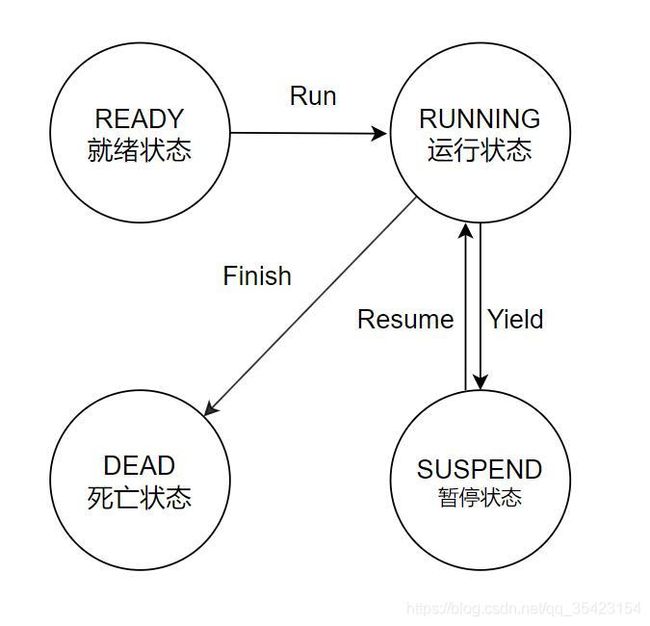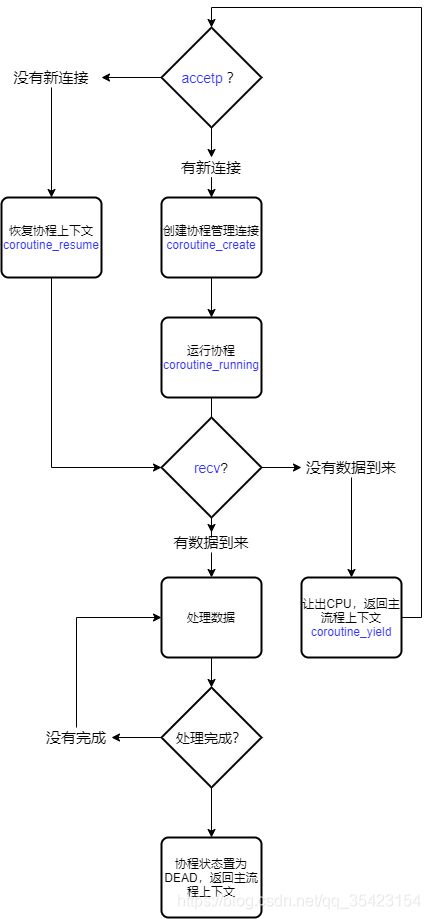【项目介绍】协程——C语言实现的用户态非抢占式轻量级线程
文章目录
- 项目介绍
- 开发语言
- 开发环境
- 项目简介
- 项目特点
- 适用场景
- 发布链接
- 使用介绍
- 上下文环境
- 宏
- 协程状态
- 协程与调度器结构体
- 接口
- 示范用例
- 使用协程实现一个TCP服务器
项目介绍
开发语言
C
开发环境
CentOS7、vim、gcc、gdb、git、MakeFile
项目简介
“协程”即用户态下的非抢占式的轻量级线程,是一种在程序开发中处理多任务的组件。
由于在C/C++中并没有引入协程这一概念,而大部分开源的库又过于重量,所以我基于ucontext组件实现了一个简单的协程库
项目特点
- 用户态实现协程的调度切换,减少了内核切换的开销。
- 非抢占式,用户自己实现调度,同一时间只能有一个协程在执行,由协程主动交出控制权。
- 基于非对称(asymmetric)模式, 控制流更加简单,程序更加结构化。
- 协程具有独立的栈,确保运行效率。
适用场景
协程主要适用于I/O密集型的场景,如示例中的TCP服务器。在传统的多路复用+多线程/多进程的做法,每并发一个进程/线程就会消耗内存,并且最严重的问题就是由系统来进行调度切换带来的严重损耗,而协程刚好能够解决这些问题。
发布链接
具体的实现请参考源代码
协程
使用介绍
上下文环境
对于上下文环境的切换可以使用很多方法
- 汇编
- C语言库函数setjmp, longjmp
- glibc的ucontext组
我在这里使用的是ucontext组件,如果不了解这个组件的使用方法,可以参考我的另一篇博客
ucontext族函数的使用及原理分析
由于ucontext只支持posix,如果需要移植到windows,只需要将api换成fiber的即可
宏
#define STACK_SIZE (1024 * 1024) //协程函数栈大小
#define COROUTINE_SIZE (1024) //协程最大数量
协程状态
协程共设置了四种状态,READY, RUNNING, DEAD, SUSPEND。下图描述了所有状态即状态之间的转换关系。

协程与调度器结构体
typedef struct coroutine
{
void* (*call_back)(struct schedule* s, void* args); //回调函数
void* args; //回调函数的参数
ucontext_t ctx; //协程的上下文
char stack[STACK_SIZE]; //协程的函数栈
enum State state; //协程状态
}coroutine;
typedef struct schedule
{
coroutine** coroutines; //协程数组
int cur_id; //正在运行的协程下标
int max_id; //数组中最大的下标
ucontext_t main; //主流程上下文
}schedule;
接口
//创建协程序调度器
schedule* schedule_create();
//创建协程, 并返回协程所处下标
int coroutine_create(schedule* s, void* (*call_back)(schedule*, void* ), void* args);
//协程让出CPU,返回主流程上下文
void coroutine_yield(schedule* s);
//恢复协程上下文
void coroutine_resume(schedule* s, int id);
//运行协程
void coroutine_running(schedule* s, int id);
//销毁协程调度器
void schedule_destroy(schedule* s);
//判断协程调度器中的协程是否全部结束, 结束返回1, 没结束返回0
int schedule_finished(schedule* s);
示范用例
使用协程实现一个TCP服务器
#include 
